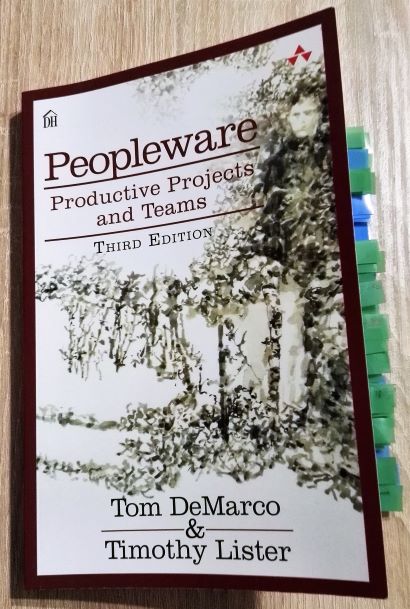It is always a funny feeling when you read a book published at the year when you were born. And it means that the book is 31 years old. Why did I decide to reach for “Peopleware: Productive Projects and Teams” by Tom DeMarco and Tim Lister? There were two things. The first was 4.6 out of 5 starts and 201 reviews on Amazon. And the second was Joel Spolsky (Co-founder of Stack Overflow) opinion:
Peopleware is the one book that everyone who runs a software team needs to read and reread once a year. In the quarter century since the first edition appeared, it has become more important, not less, to think about the social and human issues in software development. This is the only way we’re going to make more humane, productive workplaces. Buy it, read it, and keep a stock on hand in the office supply closet.
Now when I’m after, I just can make the conclusion: I couldn’t agree more with Joel.
What is the book about
The title is actually self-explaining. “Peopleware” is a series of essays about building productive projects and teams. It touches several topics from various areas like:
- managing the human resources
- the office environment
- the right people
- growing productive teams
- meetings, mails, community, organizational learning
- fun in work
Sometimes it is presented via positive or negative cases. Authors refer also scientific researches for some topics, but they mostly based on their own and their speakers’ experience. Some topics for me were well known, some were refreshing and some totally new. And everything was worth to read.
I decided to write a bit about three topics which for me at the moment are really important. And it is just three not because there are no more things worth to mention. Just three, otherwise I will be forced to go through every single chapter since my book now looks like that:

The menager’s function
I’m a dev lead for more than one year and I’m still learning it. Honestly, I feel like I’m going to learn this my whole life. The human interaction is a something what you cannot master to be never surprised. And as a dev lead, I have to communicate with people inside and outside of the team. People and their needs from outside of the team are quite often obstacles on our journey. And for me:
The manager’s function is not to make people work but to make it possible for people to work.
Among many things it is taking care of people’s development, inspiring and motivating them and removing obstacles from their path. Obstacles like a meaningless meeting. And like Uncle Bob said:
Managers and leads, one of your high priority goals is to keep your people out of meetings.
— Uncle Bob Martin (@unclebobmartin) December 7, 2018
Quality is free, but
Companies tend to say that quality is always on the top priorities list. But is it always true? Have you ever heard we don’t have time for unit tests? We don’t have time for TDD? It will slow down us, let’s go with the old approach. Why does it take so long? We don’t want to refactor it, please just add this few lines and that’s it. If you heard these then you know it that quality is just a slogan. And
Quality is free, but only to those who are willing to pay heavily for it.
If you put quality in the first position then you must find time for unit tests, performance tests and refactor. Yes, initially you will do your tasks slower, but you will benefit with increased productivity at the end due to a quality standard. People like to have error-free applications, so what we have to do is to just give them a chance to do it.
Leadership as a service
In order to lead without positional authority - without anyone ever appointing you a leader - you have to do what Mike does:
- Step up to the task.
- Be evidently fit for the task
- Prepare for the task by doing the required homework ahead of time.
- Maximize value to everyone.
- Do it with humour and obvious goodwill.
It clearly describes how leadership should work. It’s not a position, nor a title. It’s about service to make it possible for the magic to happen.
Conclusion
The time spent on a reading this book was a good investment. There are many things for a consideration. For now, I picked up three which I’m going to focus the most on my daily work. And you - do you have yours? What are your priorities in your manager/leader role?

Comments